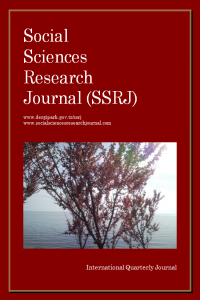Is There a Long-run Association between Globalization and Labor Productivity?: Panel Evidence from OECD Countries
Globalization, Labor Productivity, Panel Unit Root Test, PMG Method, Panel Causality Test, Panel Cointegration
Is There a Long-run Association between Globalization and Labor Productivity?: Panel Evidence from OECD Countries
Globalization, Labor Productivity, Panel Unit Root Test, PMG Method, Panel Causality Test, Panel Cointegration,
___
- Auzina-Emsina, A. (2014). Labour productivity, economic growth and global competitiveness in post-crisis period. Procedia-Social and Behavioral Sciences, 156, 317-321.
- Bracker, K., Docking, D. S., & Koch, P. D. (1999). Economic determinants of evolution in international stock market integration. Journal of Empirical Finance, 6(1), 1-27.
- Chen, P., & Semmler, W. (2018). Short and long effects of productivity on unemployment. Open Economies Review, 1-26.
- Csordás, S. (2018). Commodity exports and labour productivity in the long run. Applied Economics Letters, 25(6), 362-365.
- Dreher, A. (2006). Does globalization affect growth? Evidence from a new index of globalization. Applied Economics, 38(10), 1091-1110.
- Dumitrescu, E.-I., and C. Hurlin. 2012. Testing for Granger non-causality in heterogeneous panels. Economic Modelling, 29, 1450-1460.
- Edwards, S. (1998). Openness, productivity and growth: what do we really know?. The economic journal, 108(447), 383-398.
- Erdem, E., & Türker, O. (2012). Orta Asya Cumhuriyetlerinde Ekonomik Serbestlik ve Büyüme İlişkisi. In International Conference on Eurasian Economies (pp. 175-182).
- Hayaloğlu, P., Kalaycı, C., & Artan, S. (2015). Küreselleşme Farklı Gelir Grubundaki Ülkelerde Ekonomik Büyümeyi Nasıl Etkilemektedir. Eskişehir Osmangazi Üniversitesi İİBF Dergisi, 10(1), 119-152.
- Kang, Y. H., Na, K., & Kim, Y. S. (2018). Labor Productivity in Emerging Markets: Evidence from Brazil, China, India, And Russia (BRIC). The journal of Applied Business Research, 34(2), 325-338.
- Kentor, J. (2001). The long-term effects of globalization on income inequality, population growth, and economic development. Social Problems, 48(4), 435-455.
- Kobrin, S. J. (1991). An empirical analysis of the determinants of global integration. Strategic Management Journal, 12(S1), 17-31.
- Koyuncu, C., & İşcan, İ. H. (2017). Does Intelligence Enhance Labor Productivity? Cross-Country Evidence. Social Sciences Research Journal, 6(4), 99-115.
- Koyuncu, C., & Okşak, Y. (2017). The Association between Subsidies and Productivity: Panel Analysis. Journal of Economics Library, 4(1), 76-82.
- Koyuncu, C., & Yilmaz, R. (2010). Chinese exports and productivity gains: panel evidence. Asian‐Pacific Economic Literature, 24(2), 161-170.
- Koyuncu, J. Y., Yılmaz, R. & Yıldırım, S. (2017). Internet Penetration and Productivity: A Panel Study. Anadolu Üniversitesi Sosyal Bilimler Dergisi, 17 (1), 59-66.
- Koyuncu, J. Y., & Unver, M. (2017). The Association between Corruption and Globalization in African Countries. Social Sciences Research Journal, 6(4), 20-28.
- Koyuncu, J. Y., Yılmaz, R., & Ünver, M. (2016) The Relationship between Female Labor Force Participation and Labor Productivity: Panel Data Analysis. Eskişehir Osmangazi Üniversitesi İİBF Dergisi, 11(2), 237-250.
- Lieberman, M. B. (1991). Determinants of Vertical Integration: An Empirical Test. Journal of Industrial Economics, 39(5), 451-466.
- Manda, D. K., & Sen, K. (2004). The labour market effects of globalization in Kenya. Journal of International Development, 16(1), 29-43.
- Márquez-Ramos, L., Florensa, L. M., & Recalde, M. L. (2017). Understanding the determinants of economic integration in Latin America. Journal of Economic Integration, 558-585.
- Nistor, C. (2007). Positive and Negative Effects of Globalization. Universitatii Bucuresti. Analele. Seria Stiinte Economice si Administrative, 1, 152.
- Okşak, Y., & Koyuncu, J. Y. (2017). Does globalization affect female labor force participation: Panel evidence. Journal of Economics Bibliography, 4(4), 381-387.
- Pesaran, M. H. (2007). "A Simple Panel Unit Root Test in the Presence of Cross-section Dependence." Journal of Applied Econometrics, 22, 265-312
- Pesaran, H., (2003), A Simple Panel Unit Root Test in the Presence of Cross Section Dependence, Cambridge Working Papers in Economics 0346, Faculty of Economics (DAE), University of Cambridge
- Preenen, P. T., Vergeer, R., Kraan, K., & Dhondt, S. (2017). Labour productivity and innovation performance: The importance of internal labour flexibility practices. Economic and Industrial Democracy, 38(2), 271-293.
- Saud, S., & Chen, S. (2018). An empirical analysis of financial development and energy demand: establishing the role of globalization. Environmental Science and Pollution Research, 1-12.
- Shirov, A. A., Gusev, M. S., Yantovskii, A. A., & Potapenko, V. V. (2012). Long-term development of the Russian economy and the problem of labour productivity. Studies on Russian Economic Development, 23(1), 1-13.
- Topal, M. H., & Günay, H. F. (2017). Küresel Kamu Malları Perspektifinden Küreselleşme, Yoksulluk Ve Küresel Barış Arasındaki İlişki. Global Journal of Economics & Business, 6(11), 57-69.
- Westerlund, J. 2005. New simple tests for panel cointegration. Econometric Reviews 24: 297-316.
- Westerlund, J. 2007. Testing for Error Correction in Panel Data. Oxford Bulletin of Economics and Statistics 69(6): 709-748.
- Yaşar, E., & Yaşar, M. (2017). Küresel Servet Eşitsizliği ve Çokuluslu Bir Sınıflama. İşletme Araştırmaları Dergisi, 9(4), 259-282.
- Yay, G. G., & Aksoy, T. (2018). Globalization and the welfare state. Quality & Quantity, 52(3), 1015-1040.
- Yildirim, K., Koyuncu, C., & Koyuncu, J. (2009). Does Temperature Affect Labor Productivity: Cross-Country Evidence. Applied Econometrics and International Development, 9(1), 29-39.
- Ying, Y. H., Chang, K., & Lee, C. H. (2014). The impact of globalization on economic growth. Romanian Journal of Economic Forecasting, 17(2), 25-34.
- Yayın Aralığı: Yılda 4 Sayı
- Yayıncı: Denta Florya ADSM Limited Company
Gülbeniz AKDUMAN, Zeynep HATİPOĞLU
Eko-Kent Planlama Modelinde Kadın Girişimciliğinin Rolü
TÜRKİYE’NİN YENİ YÖNETİM DÜZENİ: CUMHURBAŞKANLIĞI HÜKÜMET SİSTEMİ
27 MAYIS 1960 DARBESİ’NE SEBİLÜRREŞAD DERGİSİ’NİN BAKIŞI
Türkiye’de Uygulanan İnovasyon Destekleri
TÜRKİYE’DE LOJİSTİK YÖNETİMİNDEKİ GELİŞMELER: STRATEJİK BİR BAKIŞ AÇISI
Deniz YILDIZ, Reyhan Ayşen WOLFF
Anfis Ve Regresyon Analizi İle Enflasyon Tahmini Ve Karşılaştırması
